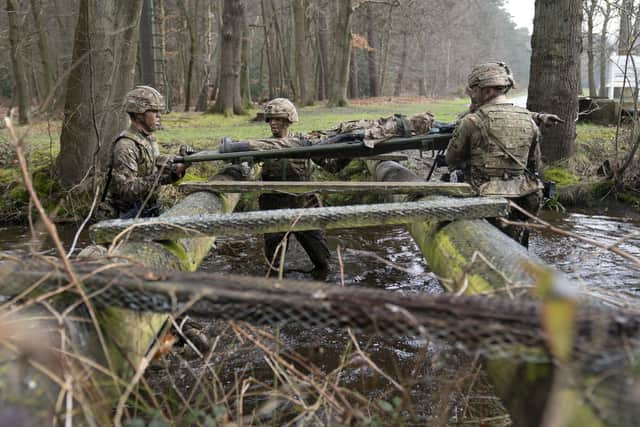Why the idea of conscription sends a shiver down my spine - Jayne Dowle
In the face of the possibility of a full-scale war with a country such as Russia, civilians – and that will mean people of fighting age, like my son and daughter – will need to be trained and equipped to help make up a new ‘citizen army’, in case we find our country dragged into conflict.
Within three years Britain should assemble a larger army of 120,000, including regular soldiers, reserves and a “strategic reserve” of former service personnel who could be recalled in the event of an emergency, Sir Patrick, chief of the general staff, said.
Advertisement
Hide AdAdvertisement
Hide AdHowever, this would not be enough to win a war, he added; taking steps to ensure that the public was on a “war footing when needed” would be essential, through the “prudent” move of laying the foundations for national mobilisation.


National mobilisation. If you weren’t on earth during the Second World War, did you ever think you would hear those words in your lifetime? And are you wondering, as I am, why it has been left to a senior Army man to deliver this stark message?
Sir Patrick will retire later this year. He’s clearly throwing a hand grenade. It’s said that he’s going at the early age of 57 partly because he is livid with the government over cuts to Army numbers and failure to recruit.
In a one-year period up to September last year, the Army's strength plummeted from 79,139 to 75,983 as more soldiers left than started, according to official figures. Based on current trends, this means there will be just 52,000 troops in 10 years, with the Royal Navy and RAF also reporting similar challenges.
Advertisement
Hide AdAdvertisement
Hide AdThe answer? Defence Secretary Grant Shapps announcing an offensive to enlist more women into Britain's military; currently women make up just a fraction of Britain's military forces, around 11.3 per cent of total numbers.
If the threat posed by potential war really is this serious, shouldn’t the entire Cabinet be taking the reins, given that it will be its job to persuade 63 million UK citizens that what they really want to do is lay down their lives – or the lives of their family members – in the defence of an increasingly shaky realm?
As Shadow Defence Secretary John Healey, says: “On current trends, our Army is set for further decline if ministers do not get to grips with their recruitment and retention crisis.”
But this demands subtlety, not scaremongering.
My son, Jack, is 21 and my daughter, Lizzie, is 18. I’ll remind you of their names and ages because it is extremely important to remember that any citizen army, trained and equipped to be ready to fight at any given moment, will be made up of people. Individuals, not numbers. Each one will be a son, a daughter, a brother, a sister, a significant other to someone else.
Advertisement
Hide AdAdvertisement
Hide AdI am trying not to catastrophize, but the thought of it strikes absolute fear in my heart. My children have friends who have chosen to serve their country, but this is different. Although the prospect of conscription has hastily been quashed by the Ministry of Defence, with a spokesman saying any enlisting would be “voluntary”, pressure is ramping up.
The Second World War still casts a long shadow over my family, as it does for millions. My own grandfathers were miners; they were in a reserved occupation so not compelled to enlist.
But my maternal grandmother, Gladys, joined the ATS (Auxiliary Territorial Service) in 1939 as a cook, and my children’s paternal grandmother, Marjorie, became an ATS sergeant.
Marjorie’s brother, Arthur, the only boy in a family of four, was killed at Caen in 1944 at 21 during the D-Day Landings.
Advertisement
Hide AdAdvertisement
Hide AdIn 2013, we went to see Arthur’s grave in a quiet cemetery just outside Arromanches, row upon row of white crosses, engraved with rarely an age over 25. This young man’s untimely death still echoes down the generations.
I know I am being selfish, and idealistic, but I cannot believe that two decades into the 21st century, when technology is evolving faster than at any point in history, apart from perhaps the spark that set the Industrial Revolution alight, we are talking about committing countless numbers of troops to the kind of land war we never expected to see again.
I’m anxious for my own children, for our cherished way of life and the freedoms we take for granted, but also, now more personally concerned about the state of the world than at any other time in my life, except the early 1980s when the threat of nuclear war hung in the air.
Comment Guidelines
National World encourages reader discussion on our stories. User feedback, insights and back-and-forth exchanges add a rich layer of context to reporting. Please review our Community Guidelines before commenting.
